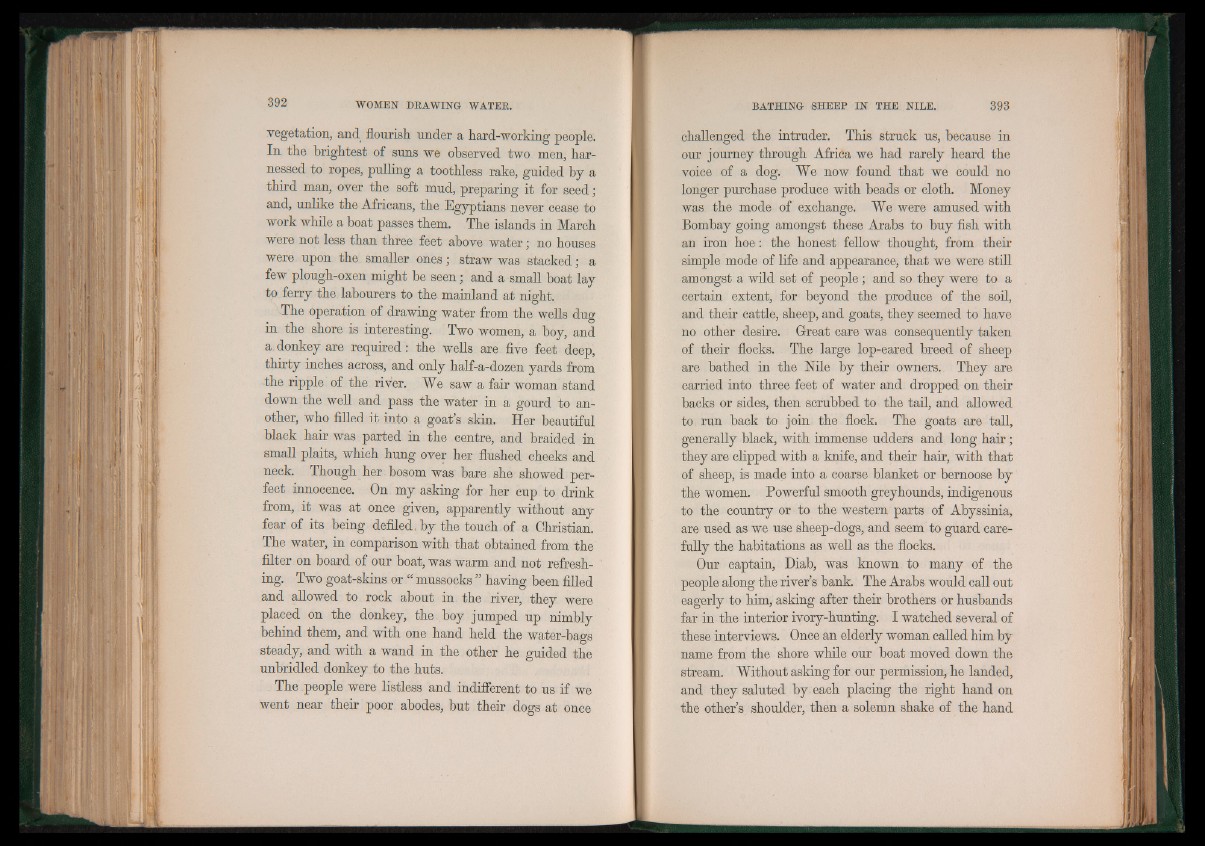
vegetation, and flourish under a hard-working people.
In the brightest of suns we observed two men, harnessed
to ropes, pulling a toothless rake, guided by a
third man, over the soft mud, preparing it for seed;
and, unlike the Africans, the Egyptians never cease to
work while a boat passes them. The islands in March
were not less than three feet above water, no houses
were upon the. smaller ones; straw was stacked; a
few plough-oxen might be seen; and a small boat lay
to ferry the labourers to the mainland at night.
The operation of drawing water from the wells dug
in the shore is interesting. Two women, a boy, and
a donkey are required: the wells are five feet deep,
thirty inches across, and only half-a-dozen yards from
the ripple of the river. We saw a fair woman stand
down the well and pass the water in a gourd to another,
who filled it into a goat’s skin. Her beautiful
black hair was parted in the centre, and braided in
small plaits, which hung over her flushed cheeks and
neck. Though her bosom was bare she showed perfect
innocence. On my asking for her cup to drink
from, it was at once given, apparently without any
fear of its being defiled, by the touch of a Christian.
The water, in comparison with that obtained from the
filter on board of our boat, was warm and not refreshing.
Two goat-skins or “ mussocks ” having been filled
and allowed to rock about in the river, they were
placed on the donkey, the boy jumped up nimbly
behind them, and with one hand held the water-bags
steady, and with a wand in the other he guided the
unbridled donkey to the huts.
The people were listless and indifferent to us if we
went near their poor abodes, but their dogs at once
challenged the intruder. This struck us, because in
our journey through Africa we had rarely heard the
voice of a dog. We now found that we could no
longer purchase produce with beads or cloth. Money
was the mode of exchange. We were amused with
Bombay going amongst these Arabs to buy fish with
an iron hoe: the honest fellow thought, from their
simple mode of life and appearance, that we were still
amongst a wild set of people; and so they were to a
certain extent, for beyond the produce of the soil,
and their cattle, sheep, and goats, they seemed to have
no other desire. Great care was consequently taken
of their flocks. The large lop-eared breed of sheep
are bathed in the Nile by their owners. They are
carried into three feet of water and dropped on their
backs or sides, then scrubbed to the tail, and allowed
to run back to join the flock. The goats are tall,
generally black, with immense udders and long hair;
they are clipped with a knife, and their hair, with that
of sheep, is made into a coarse blanket or bernoose by
the women. Powerful smooth greyhounds, indigenous
to the country or to the western parts of Abyssinia,
are used as we use sheep-dogs, and seem to guard carefully
the habitations as well as the flocks.
Our captain, Diab, was known to many of the
people along the river’s bank. The Arabs would call out
eagerly to him, asking after their brothers or husbands
far in the interior ivory-hunting. I watched several of
these interviews. Once an elderly woman called him by
name from the shore while our boat moved down the
stream. Without asking for our permission, he landed,
and they saluted by each placing the right hand on
the other’s shoulder, then a solemn shake of the hand